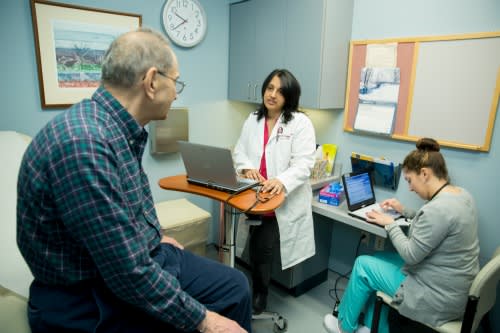By Melissa K. Goldstein, MD, Endocrinology, Stamford Health
It is really nice to see the public getting more comfortable and accepting of the transgender community. Stamford Health has added the option to our electronic medical record so you no longer need to just choose between male or female. Many restaurants have genderless restrooms and more children's sports and activities are becoming gender inclusive. These are just a couple, of many, examples of society changing to become all-inclusive.
When it comes to transgender medicine and caring for transgender patients, what does it all mean and how does it all work?
We also often include other providers such as a primary care physicians, gynecologists and surgeons, especially if there is a plan for surgical transition.
Many will choose to bank sperm or freeze eggs to assist with fertility in the future. In cases where family and friends are less supportive, having a therapist or psychiatrist can be helpful as well.
This usually starts in the social setting where the person will change clothing and hairstyle. Sometimes they choose to be called by another name. Many of my patients choose to start with hormones to assist in the physical changes.
For some, a decision is made to undergo gender affirmation surgery. It is great to see more and more surgeons becoming experts and more insurance companies covering the cost!
Some parents may worry that delaying puberty may “push” their child to become transgender. Just remember, as much as we can’t force a transgender person not to be transgender, we cannot push a non-transgender person to become transgender. In fact, some studies have shown that transgender brain structure and activity matched patterns with their desired gender, not their birth sex.
My hope is that as we progress in the future, positive changes in the transgender community will continue to multiply.
It is really nice to see the public getting more comfortable and accepting of the transgender community. Stamford Health has added the option to our electronic medical record so you no longer need to just choose between male or female. Many restaurants have genderless restrooms and more children's sports and activities are becoming gender inclusive. These are just a couple, of many, examples of society changing to become all-inclusive.
When it comes to transgender medicine and caring for transgender patients, what does it all mean and how does it all work?
Here are the transgender medicine terms to know:
- Transgender – A person who identifies with the gender not assigned at birth
- Cisgender – A person who identifies with the gender assigned at birth
- Non-binary – A person who does not identify strictly as male or female
- Gender dysphoria – The distress that occurs when a person’s chosen gender is different from their gender assigned at birth
- Transition – When transgender individuals change their social and physical characteristics to align more with the chosen gender
How can I help society become more inclusive and respectful of transgender and gender-fluid individuals?
- First, you can ask which pronouns the person prefers to use. He/Him and She/Her are specific to male and females, respectively. Non-binary and gender-fluid individuals often prefer to go by They/Them.
- Second, during conversation, try to choose words that describe relationships as opposed to gender ("parents" vs. "mother and father") and address groups that way as well ("everyone" vs. "ladies and gentlemen").
What doctors are involved in a transgender patient's treatment?
Endocrinologists are involved to provide hormone therapy.We also often include other providers such as a primary care physicians, gynecologists and surgeons, especially if there is a plan for surgical transition.
Many will choose to bank sperm or freeze eggs to assist with fertility in the future. In cases where family and friends are less supportive, having a therapist or psychiatrist can be helpful as well.
How does a person transition?
Every individual is different with when, how, and how much they want to transition.This usually starts in the social setting where the person will change clothing and hairstyle. Sometimes they choose to be called by another name. Many of my patients choose to start with hormones to assist in the physical changes.
For some, a decision is made to undergo gender affirmation surgery. It is great to see more and more surgeons becoming experts and more insurance companies covering the cost!
What about kids who are thinking about transitioning?
If a child is thinking of becoming transgender before puberty starts, sometimes medications are given to stop puberty from happening. Once it is confirmed, the child can later take cross-sex hormones for the gender with which they identify. If the child changes their mind about being transgender, the blocking medications are stopped and puberty occurs naturally.Some parents may worry that delaying puberty may “push” their child to become transgender. Just remember, as much as we can’t force a transgender person not to be transgender, we cannot push a non-transgender person to become transgender. In fact, some studies have shown that transgender brain structure and activity matched patterns with their desired gender, not their birth sex.
What is the best advice for someone who is gender fluid?
When it comes to transitioning, it is okay to not know how far to take it and it is okay to change your mind. The first step is to just find someone to talk to, whether a therapist or an endocrinologist like myself, or even one of the many support groups that exist in the community.My hope is that as we progress in the future, positive changes in the transgender community will continue to multiply.
About Melissa K. Goldstein, MD
While Dr. Goldstein enjoys taking care of any endocrinology problem, special interests include thyroid cancer, hypogonadism and thyroid disease and diabetes in pregnancy. In addition, Dr. Goldstein is experienced in hormone treatment of transgender individuals.Featured Expert/ Author
















